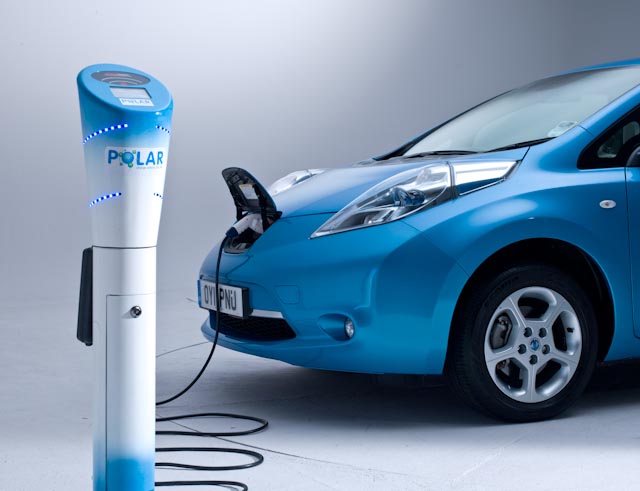Imagine you're a carmaker, and you found you could build a type of vehicle that customers all absolutely adored.
Not just liked. Not just said, "Yeah, it's fine, it does what I need"--but out-and-out loved, cherished, talked about incessantly, and recommended to everyone they met, all the time.
Those cars exist today. They're called electric cars.

Polar Charging Post and Nissan Leaf
The customer satisfaction scores for plug-in electric cars are off the charts, and have been pretty much since they were introduced.
General Motors has said the Chevrolet Volt, launched in December 2010, has the highest satisfaction scores it has seen on any vehicle it's ever built. And Consumer Reports confirmed the high satisfaction in its own survey, with the Volt topping its fall 2012 satisfaction index.
Same for the Nissan Leaf: Nissan CEO Carlos Ghosn said the car has the highest owner-satisfaction survey results Nissan's seen since it began asking owners their opinions.
In France, Nissan's alliance partner Renault got the same result for the Zoe battery-electric subcompact it launched a little more than a year ago (a car not sold in North America).
Then, late last year, the Tesla Model S knocked the Volt off the top of the Consumer Reports chart. The magazine said the electric luxury sedan had some of the highest owner satisfaction ratings it had ever seen.
Angry Driver with Road Rage
Why do owners love them so much? One reason, as we noted almost two years ago, is that they're simply nicer to drive:
MORE: Electric Cars' Secret Advantage: They're Just Nicer To Drive
They're quieter, smoother, calmer, and more relaxing to drive--even in lousy traffic--than cars that go "boing-boing-boing" (to use the description from a Mazda rotary ad of 40 years ago).
We were shocked by how calm the 2014 BMW i3 made us feel even in daunting, stop-and-go Amsterdam rush-hour traffic amidst not only other cars and trucks, but also buses, trams, motorcyclists, bicyclists, and pedestrians--all of them seemingly everywhere at once.
MORE: Electric Cars Sell Faster Than Hybrids Did At Same Point
In the end, we tend to think that the rave reviews by owners and the word of mouth they tend to spread will lead to growth in electric-car sales that's greater than that of hybrids at the same phase of their launch.

2012 Toyota Prius Plug-In Hybrid, Catskill Mountains, NY, Oct 2012
No, electric cars aren't perfect. Some Nissan Leafs in hot climates have lost capacity faster than their owners expected, leading a small but vociferous group of owners to complain about their cars.
And, of course, the range of battery-electric vehicles--from 62 to 265 miles--won't let you hop in one and drive across the country on whatever roads you like.
(Though Tesla's Supercharger network does make it possible to travel all-electrically from Los Angeles to New York today with only 20-minute stops to recharge--a feat unimaginable just five years ago.)
But in the end, customer satisfaction counts for a lot. Perhaps the scores will subside as more electric cars hit the roads, but we're not convinced.
What do you think: Are electric cars simply a better way to travel? Do they deserve the rave reviews they receive from the folks who put down tens of thousands of dollars to buy them?
Leave us your thoughts in the Comments below.
_______________________________________________













